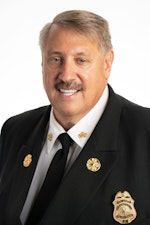I have been on several calls during my career where people were playing a game of Russian roulette. Usually, the people were young and drinking was involved. In Russian roulette, one bullet is loaded in chamber of a revolver and the cylinder is spun. If the cylinder has six chambers, and one chamber contains a bullet, obviously five are empty. After the cylinder has been spun, a person puts the gun to their head and pulls the trigger. There is a one in six chance that you will get shot in the head on a six-chamber cylinder. Play Russian roulette often enough and eventually the law of averages will catch up with you. You won’t be playing the game anymore. You’ll be dead.
The same applies to paramedics who make a habit of talking people out of going to the hospital. Sure, you may talk the first patient out of going to the hospital because you do not think there is anything wrong with them and nothing serious does happen. You may talk the second patient out of going to the hospital with the same results. You may get away with doing this for years. But just like Russian roulette, the odds are against you. Eventually, you’re going to talk someone out of going to the hospital who really needs to go and the result is a tragedy. The person may die or suffer in some other way. I’ve also seen paramedics who work harder at convincing someone not to go to the hospital than if they were just to take them to the hospital.
Unhappy endings
In one major city, a paramedic responded to a patient with chest pain. After running an EKG, listening to the man’s lungs and asking a few assessment questions, the paramedic diagnosed the patient with acid reflux and told him to take some antacid tables. The patient complied with the instructions and died three hours later from the heart attack he was suffering. In another case, a paramedic who was concerned about getting off duty on time told the mother of a child who was suffering an asthma attack to just put the child in the hot shower and let the steam open up her wheezing airway. That child also died a few hours later.
How about the patient who calls a friend who lives out of town and tells her she is going to commit suicide by taking all her pain medications? The friend calls the police in that community. An EMS crew responds, talks to the patient, reports “she says is fine and was just venting to her friend.” During the assessment process, the patient says she didn’t take any pills and that she will be just fine. The paramedics check the pill bottle and see all the pains meds are still there. They decide everything is fine and ask the patient sign a refusal, which she does gladly. The paramedics then leave the patient home alone. The next day the patient is found dead. Even though they did not talk her out of going to the hospital, they certainly did nothing to encourage her to go or have the police take her into custody. Leaving her home alone was a major mistake.
It seems like paramedics who are trying to get out of work capitalize on several points. First, the patient assumes that because paramedics are medically trained, they must know what they are talking about – if the paramedics say I don’t have to go to the hospital, then it must be true. This is especially true if the patient or their family members are not well educated and assume that the professionals know what they are talking about. Second, paramedics capitalize on a patient’s financial fears. I’ve heard paramedics say, “This trip to the hospital is going to cost you $600.” Big mistake! For a tax-based service, this is not a part of the assessment process. Third, patients sometimes are in denial and don’t believe that anything is wrong with them. This fear plays into efforts by paramedics to talk them out of going to the hospital.
I have predominantly seen the trait of talking patients out of going to the hospital among senior and longer-tenured paramedics. It appears as they advance longer into their career, they get tired of those who call for an ambulance without valid reasons. They begin to question the use of such important and expensive resources for what they consider mild or less-than-severe conditions, especially when the patient could easily have been driven to the hospital by a family member – especially when family members are at home and there’s a car in the driveway. Most of these calls may be minor and the patients could have been driven to the hospital in a privately owned vehicle, but this thinking can begin to alter the judgment of the paramedic who is more concerned with getting back to the station. This lapse of judgment is dangerous.
If they want to go, take them
As I have always told paramedics, just go ahead and transport patients to the hospital. If you’re not on this call, there is a chance you may catch another call after you come in service from this one. Additionally, why would you want to jeopardize your license or career with a lawsuit if something goes wrong?
Bottom line – if someone wants to go to the hospital, just take them! Don’t play Russian roulette.
For more news and training on EMS, visit http://EMSWorld.com/.
GARY LUDWIG, a Firehouse® contributing editor, has 35 years of fire, rescue and EMS experience. He currently serves as a deputy fire chief for the Memphis, TN, Fire Department. Ludwig is also chair of the EMS Section for the International Association of Fire Chiefs. He can be reached through his website at garyludwig.com.

Gary Ludwig
GARY LUDWIG has served in three fire departments over his career: St. Louis, Memphis, and Champaign, IL. His fire, EMS and rescue career spanned a total of 46 years, and he has been a paramedic for over 44 years. Ludwig served as president of the International Association of Fire Chiefs in 2019-20. He has a Master’s degree in Business and Management, has written over 500 articles for professional fire and EMS publications and is the author of seven books.
Connect with Gary
Email: [email protected]
Facebook: Gary Ludwig
Twitter: @ChiefGaryLudwig
Website: garyludwig.com






